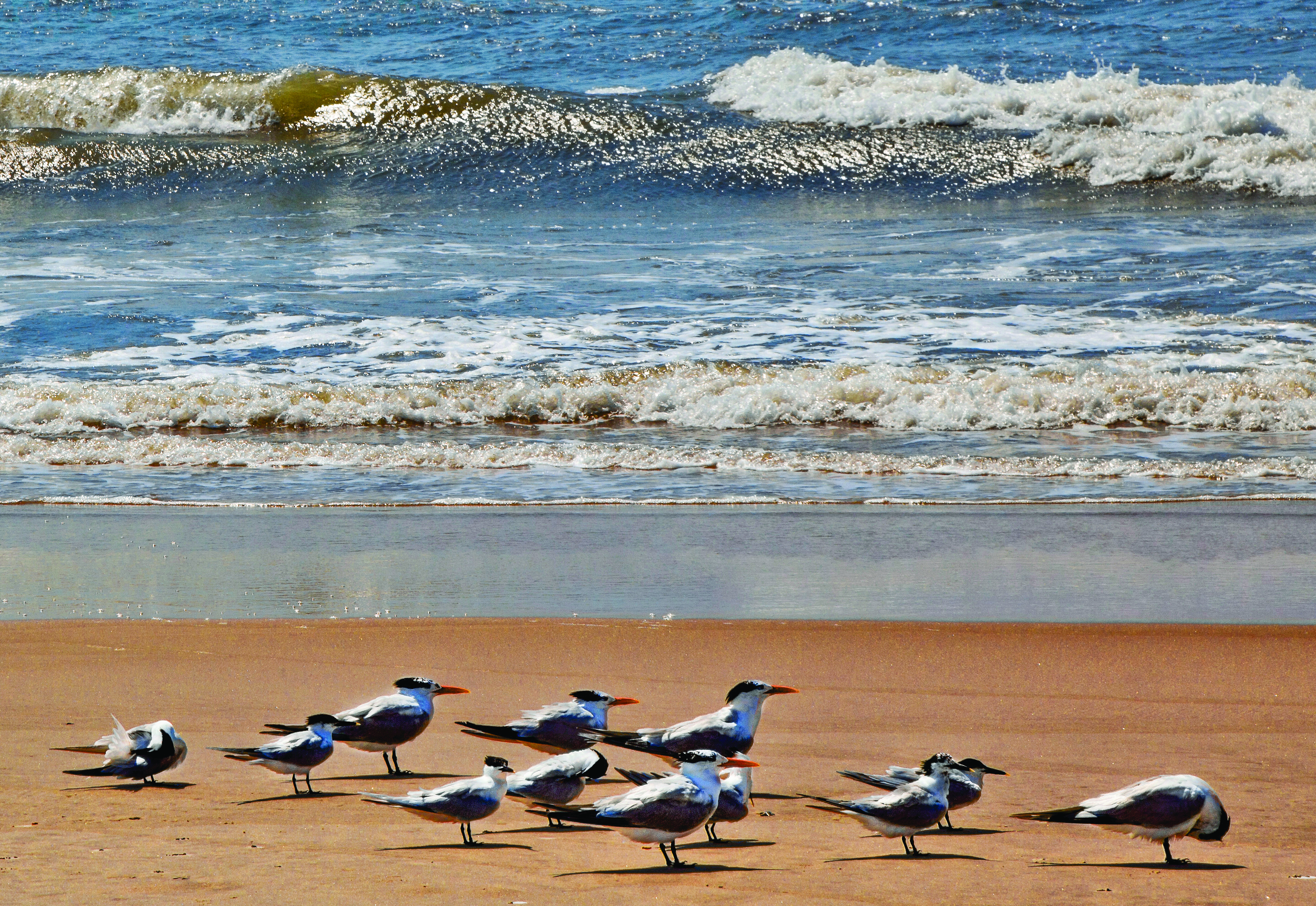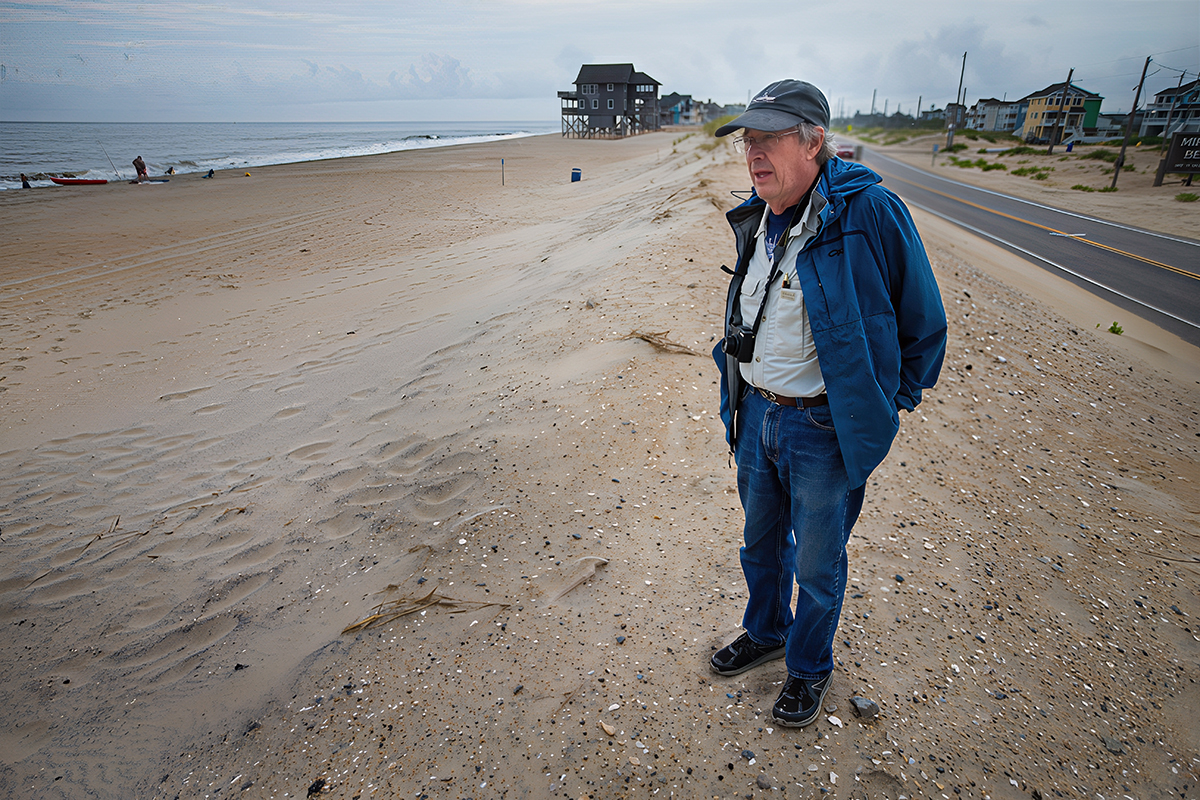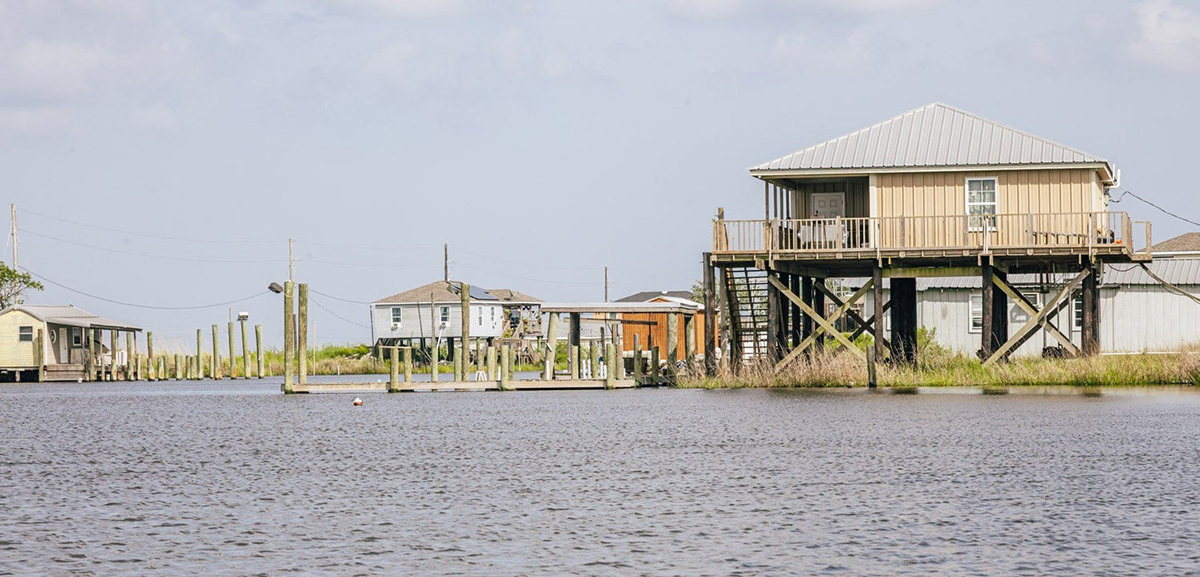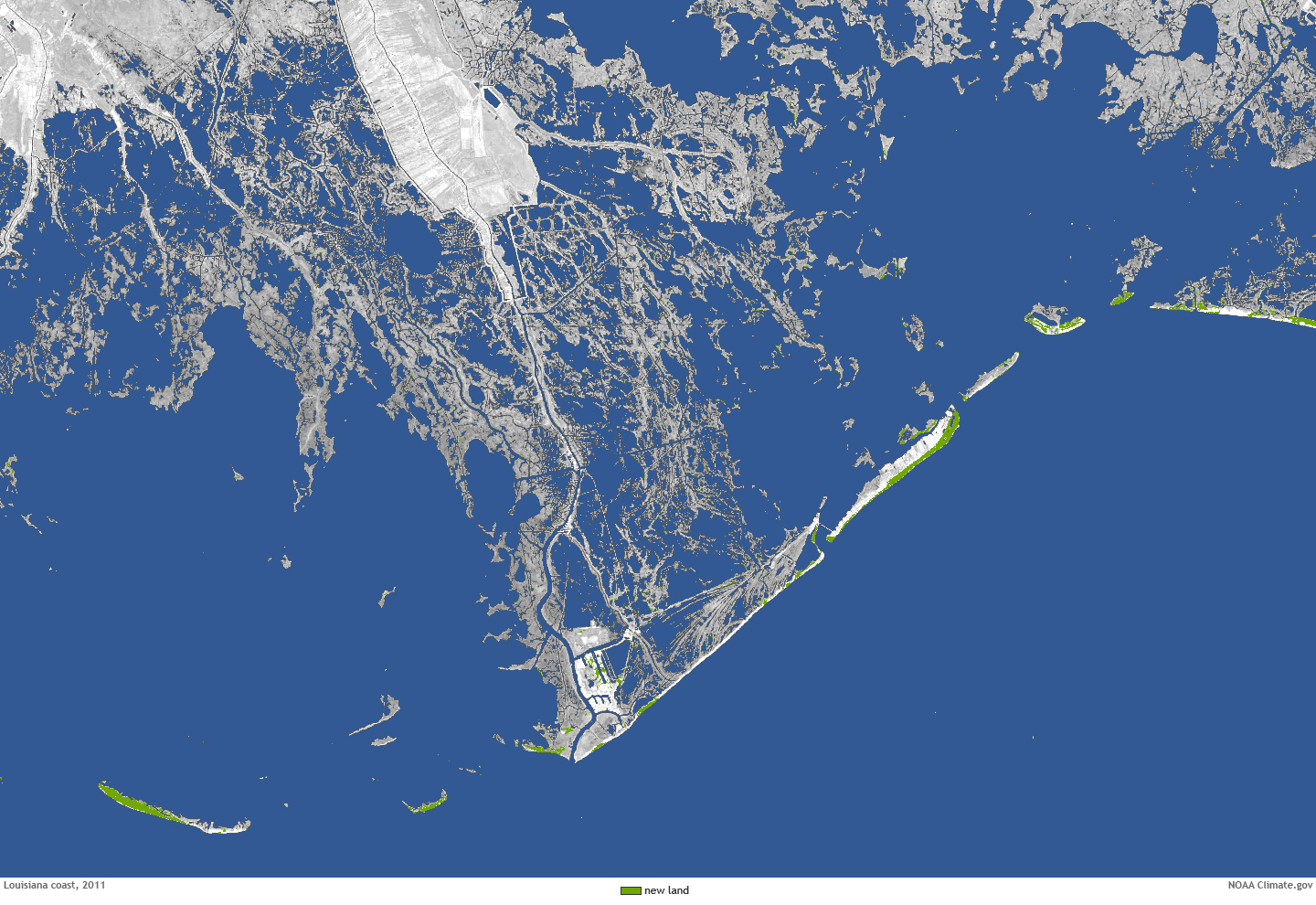Tony Morris pulled up and docked his green boat by the open-air seafood market in Surf City. The commercial fisherman was getting ready to go to work offshore catching grouper, just as he has for the last 35 years.
Before he headed out, Morris walked inside the fish market to look for a reporter who he had agreed to meet. It didn’t take long to spot me. I was holding a notebook and tape recorder with a bulky camera bag slung over my shoulder.
Supporter Spotlight
The Topsail native responded to my question about drilling off the N.C. coast with one of his own. “How’re you going to stop it?” he asked. “It’s big money.”
Drilling could take place at the heart of grouper bottom. The fish come in from the deep sea to spawn near the continental shelf break. That’s where Morris was headed that day. It’s a narrow band he fishes, between 45 and 60 miles offshore. The draft, federal offshore leasing proposal released last winter restricts drilling to 50 miles from shore.
“I would say, ‘Yeah, I would fight it,’ but you can’t,” said Morris. “It’s oil. It dominates. There’s just no way around it. It’s the Koch Brothers … You just can’t stop it.”
Morris’ sentiment stayed with me like an echo as I traveled North Carolina’s southern coastline. From Calabash, near South Carolina’s border, to Morehead City, I talked to 80 people about the prospect of offshore drilling during a five-day road trip. While the majority did not support drilling off the N.C. coast, the responses varied tremendously.
Supporter Spotlight
Some people were passionate about fighting it, others like Morris thought the fight hopeless. Some argued drilling would be in the best interest of the local economy and the country. Several were caught in the middle and undecided and a few admitted they were too uninformed to make a decision.
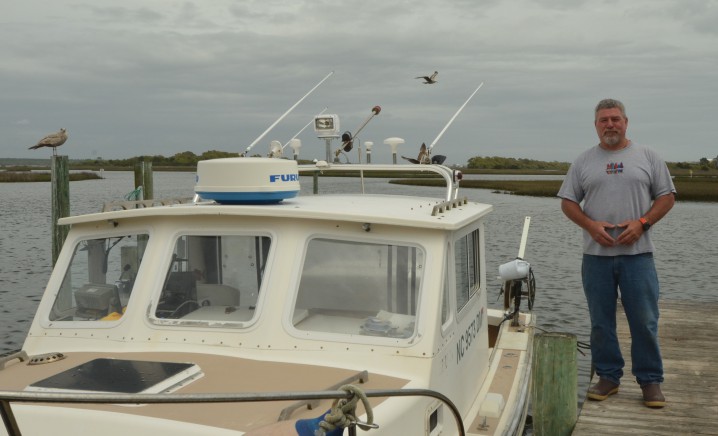
A Rainy Start
It all began on a rainy Monday morning in mid-April when I met Jim Barber of Sunset Beach. From his balcony on the third floor, you could see South Carolina. The spacious condo overlooked the nature reserve Bird Island — the last bit of beach before Little River Inlet separates the Carolinas. It’s a view of salt marsh, tidal creek, sand dune and open ocean.
Barber offered me a cup of coffee and we settled into two leather-cushioned seats in the corner of his living room. He retired here from Raleigh with his wife, Linda. On his list of major things to worry about, offshore drilling isn’t one of them, he said.
“My view,” said Barber, “is under the best scenarios, it’d be 10-plus years before there’s any serious [oil or gas] production off the coast, if everything went well. There are things that I see more on my one- or two-year horizon that are much more important.”
Barber wouldn’t be the last person I met that week who had more pressing coastal issues on his mind than the prospect of offshore drilling. Other folks who live on the island, for example, said they were worried about a terminal groin proposed for the south end of Ocean Isle, the neighboring island to the northeast. A groin, they feared, could trigger the erosion of Sunset Beach’s north end.
[su_quote cite=”John Corbett, Sunset Beach”]Most of us who are down here came down here because it’s really a beautiful, pristine beach. We really don’t want to lose any of that. If you had an oil spill, the tourism would stop completely.[/su_quote]Sunset Beach is at the base of Brunswick County, which was the fastest-growing county in the state last year after Mecklenburg. Historically, the economy and culture of Brunswick has centered on agriculture and fishing. Today, tourism is its leading economic engine. It’s also become a magnet for retirees looking to escape the snow. There are twice as many people aged 65 and over who live in Brunswick County than the state’s average, according to the U.S. Census Bureau.
Nearly everyone from Sunset Beach I spoke to that first day expressed a fear of an oil spill despoiling the town’s natural beauty, which drives its tourism. As army veteran John Corbett of Sunset Beach explained, “The economy of this little town is heavily dependent upon renting beach houses during the six to 11 weeks during the summertime. There ain’t a whole lot else here that supports it.
“Most of us who are down here came down here because it’s really a beautiful, pristine beach,” Corbett said. “We really don’t want to lose any of that. If you had an oil spill, the tourism would stop completely.”
Risk vs. Reward
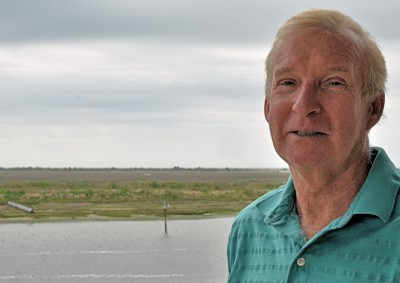
The town’s mayor pro-temp, Lou DeVita, agreed. “Most of us move to the coast to enjoy the beauty and serenity,” he said. “Towns establish themselves because tourists get attracted there, and they have an economic engine that drives them.”
He worried that small coastal communities won’t be rewarded in proportion to the risks they’d be taking with offshore drilling. So, Sunset Beach’s town council passed a resolution proposing that the ocean be cherished as are national parks.
“We believe that the oceans should likewise be regarded as a natural treasure to be preserved and protected,” the resolution states. “If drilling for oil is offensive and dangerous to the environment and wildlife in Alaska and the Western states, why is this and other invasive projects safe off our coastlines where containment in the event of a disaster is near impossible?”
As the day began to reveal, this hot-button topic was not a partisan issue. “I’m a conservative guy. I am big time,” said Dave Nelson, a longtime local of Sunset Beach who sells real estate and owns a hotel. He calls himself a “car guy” who likes gasoline and is all for oil independence.
“I’m a firm believer — and man, I’m really stepping out on the line here,” Nelson said, sitting on the couch in his hotel’s lobby, “but it’s about time that we stop this business. There’s no doubt in my mind that we don’t have the ability to come up with some type of other energy source besides just continuing down the same road — a new energy source that’s cleaner.
“When they can convince me that we’re going to get something that’s actually worthwhile besides just money, that it’s worth the effort, that it’s worth the risk, then I believe I’ll side on I’m not for it,” he said.
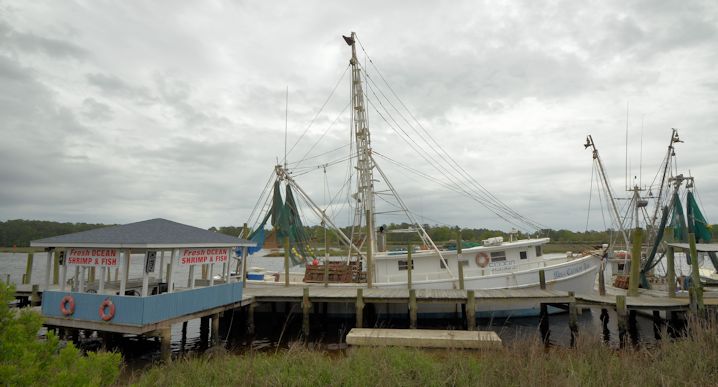
I ate lunch that first day in Calabash on the state border with South Carolina. In Calabash, you eat fried seafood. It’s so ubiquitous that “Calabash style” means battered, deep-fried fish anywhere on the N.C. coast. That day, however, was the first time I’d actually sampled the real thing in its namesake town.
Captain Nance’s Calabash Seafood Restaurant is on the waterfront. A shrimp trawler is docked outside. The family restaurant, built originally in 1975, is one of the oldest in Calabash and many of its employees are related. My waitress, Donna Nance Morgan was born and raised here. Her short, brown hair was spiked and she wore a bright pink T-shirt with the logo of her aunt’s restaurant. Like a handful of others I talked to later that afternoon in Calabash, Donna hadn’t heard about this proposal to drill offshore.
“I don’t think I could form an opinion because I’ve never lived anywhere that produces oil,” she said. “I don’t know the pros or cons, but I’d be concerned about an oil spill and how that’d affect the ecosystem and also what would happen if a hurricane came through the oil rigs.”
The N.C. coast juts out into the warm water of the Atlantic Ocean, an area nicknamed “Hurricane Alley” because of its track record of damaging hurricanes. Other people I later interviewed also worried how rigs off the coast would survive repeated hurricane seasons.
Donna brought me the lunch special: fried shrimp, fried flounder, fries and hushpuppies with honey butter and, of course, iced tea as sweet as syrup. Mainly, she’d like to know how offshore drilling would affect the seafood restaurant industry, the lifeline of her hometown.
Don’t Sully the View
U.S. 17 through Brunswick County is a monotonous stretch of asphalt past billboards, fast-food restaurants and sporadic shopping centers. Beyond the road are unseen housing subdivisions. I ended the first day inside one of them in Ocean Isle, in a gated community called Ocean Ridge Plantation, complete with four award-winning golf courses. The subdivision bills itself as “southeastern North Carolina’s most exclusive and luxurious beach and golf community.”
Tom and Jeanne Oxenfeld welcomed me for the night. They retired here early from Pennsylvania where they raised their two, now-grown, children, one of whom was visiting from out of town. After dinner, we got to talking about the heavier stuff.
I think for the community here the mindset would be if they go down to Sunset Beach and sit on the upstairs of their private beach house, and if they can see a [wind turbine] or an oil rig, forget it.[/su_quote]Tom was born and raised in nearby Wilmington. He said he’s in favor of the country becoming more independent from foreign oil but isn’t convinced of the need to drill off North Carolina’s coast, especially in light of its lack of infrastructure.
Tom Oxenfield, Ocean Isle
And, while he thinks that offshore drilling is not good for the environment, he said, he doesn’t know enough about that — something I heard many coastal residents say throughout the week. Unless it fouled swimming waters, oil isn’t something that’s going to personally affect him, he said.
“I think for the community here,” Tom said, “the mindset would be if they go down to Sunset Beach and sit on the upstairs of their private beach house, and if they can see a [wind turbine] or an oil rig, forget it.”
One of the main amenities of the area is the beach, he added, where the young retirees like to take their grandchildren when they come to visit in the summer.
Tom’s daughter, Laura, interjected. “If it doesn’t disturb the day-to-day life of the conservatives that live in this extremely wealthy enclave,” she said facetiously, “then why would it be a problem?”
The following morning I drove to Holden Beach and waited for the rain to stop inside a coffee shop on the mainland. Curt Bolden sat across from me in the café.
“There’s no industry in Holden Beach,” he said. “Most people here are retired or veterans on disability.”
Bolden was a manager of automotive plants for General Motors and Ford Motor Co. before he retired. Now he is a regular at Cappuccino by the Sea, as the shop was named, and said he moved down here largely because it was still affordable. This shop is one of the few that stays open throughout winter, and even then only on certain days because it has no heat.
“It’s a delicate balance,” Bolden said of offshore drilling. “Energy independence is important, but it’s a big ‘oops’ you have to worry about.”
He said he’s not convinced the benefits of drilling offshore outweigh the risks. As a volunteer on the sea turtle patrol, he also worries about how the sea turtles might be affected by spills. “Sea turtles are already endangered,” Bolden said. “Offshore drilling would put them at risk when their populations are already stressed.”
![Pat Moss of High Point came to fish on the Holden Beach Pier on a rainy morning. “I don’t have a problem with it [offshore drilling] as long as it’s regulated," he said. "Then again, the oil companies have the regulators in their pockets.” Photo: Tess Malijenovsky](https://coastalreview.org/wp-content/uploads/2015/07/Holden-Beach-Pier-Pat-Moss-e1435779574711.jpg)
Sea Turtles and Oil
Patrolling the beaches for sea turtle nests and watching hatchlings enter the ocean for the first time is a significant ecotourism business along the N.C. coast. It brings in $30 million annually, for example, just to Bald Head Island, which sticks out in the Atlantic at the state’s most southern cape.
“I invest $200,000 a year and I get a return of $30 million — give me a Wall Street investor that can beat that,” Suzanne Dorsey would tell me later. She’s the executive director of the Bald Head Island Conservancy, which is well known for its sea turtle conservation work.
She based the figure on a 2012 study by Gladys Delgadillo of Stanford University. The report shows that residents and visitors place a high value on the sea turtles that nest on Bald Head Island beaches as an economic factor that should be considered in decisions about development of the island. “These are my constituents who value and preserve their environment, and it pays them back”, Dorsey said.
“I’m less concerned about a giant spill,” she said, “and much more concerned about what I know will happen, and that’s the small to medium spills.”
Dorsey explained, just as ocean currents form island-like patches of sargassum seaweed on the ocean’s surface — the food source for and habitat in which hatchling sea turtles hide — the currents would direct oil there, too.
“So if sargassum is coated by oil, it dies. It then sinks. Then their habitat is gone,” she said, adding that the seaweed is also a food source and important habitat for seabirds.
I left the foggy strand of Holden Beach and drove about 24 miles to Oak Island on the other, east side of the Lockwoods Folly Inlet. The spot to find locals on a Tuesday afternoon, I was told, is a restaurant called Russell’s Place. It looked like your all-American diner. Only two middle-aged women were working the front end, pacing to and from a dining counter and passing handwritten orders through the kitchen window to the cooks. The women seemed to know most of their customers by first name, and though they remarked that business was slow, their gait suggested anything but. The menu, by no surprise, was Southern fare.
Marsha put a menu and napkin-rolled silverware in front of me at the counter and recommended the fried okra and creamed potatoes with gravy. She hadn’t heard of the plan to drill off the coast. Others throughout the week would tell me the same thing. It seems that some people are too busy worrying about the realities of today to worry about possibilities of tomorrow.
Unlike these people, there were others I encountered who were simply indifferent to offshore drilling. As one Carolina Beach resident later said to me, “Most people are ignorant to it and just don’t care. Until it actually happens in their backyard and all of a sudden sludge is coming up on the beach, then they’re going to give a shit.
“Don’t get me wrong,” he said, “there’s a lot of intelligent people on the island who care a lot about this. But the vast majority, they got other shit to worry about, like what the Kardashians are doing or what’s on Facebook.”
Tuesday: Wilmington to Morehead City



